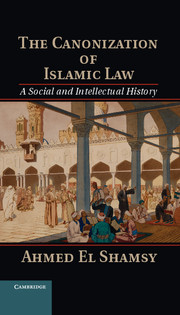
Ahmed El Shamsy, The Canonization of Islamic Law: A Social and Intellectual History
Cambridge University Press, 2013
by SherAli Tareen, New Books in Islamic Studies, January 10, 2014
In his brilliant new book, The Canonization of Islamic Law: A Social and Intellectual History (Cambridge UP, 2013), Ahmed El Shamsy, Assistant Professor of Islamic Studies at the University of Chicago, explores the question of how the discursive tradition of Islamic law was canonized during the eighth and ninth centuries CE. While focusing on the religious thought of the towering Muslim jurist Muhammad b. Idris al-Shafi‘i (d. 820) and the intellectual and social milieu in which he wrote, El Shamsy presents a fascinating narrative of the transformation of the Muslim legal tradition in early Islam. He convincingly argues that through al-Shafi‘i’s intervention, a previously mimetic model of Islamic law inseparable from communal practice made way for a more systematic hermeneutical enterprise enshrined in a clearly defined scriptural canon. Through a rich and multilayered analysis, El Shamsy shiningly demonstrates how and why this process of canonization came about. Written in a remarkably lucid fashion, this groundbreaking study will delight and benefit specialists and non-specialists alike. In our conversation, we talked about the shift from oral to written culture in early Islam, the contrast between the normative projects of Malik and al-Shafi‘i, al-Shafi‘i’s theory of language, the social and political reasons for the success of his legal theory, and the transmission of al-Shafi‘i’s thought by his students.
For an interview with the author, click here and scroll down.